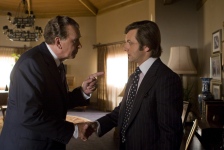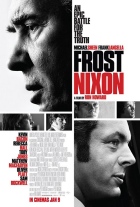Frost/Nixon
|  When British talk show host David Frost interviewed disgraced ex-President Richard Nixon on television in 1977, it was viewed by many as the trial that Nixon never had. And, while he didn’t go so far as to admit criminal guilt, Nixon did concede his involvement in a “cover up” and said that he had let down the American people and their government. It was the closest thing to a guilty plea that would ever come, since Nixon had refused to speak publicly about Watergate before the Frost interviews and never did again. When British talk show host David Frost interviewed disgraced ex-President Richard Nixon on television in 1977, it was viewed by many as the trial that Nixon never had. And, while he didn’t go so far as to admit criminal guilt, Nixon did concede his involvement in a “cover up” and said that he had let down the American people and their government. It was the closest thing to a guilty plea that would ever come, since Nixon had refused to speak publicly about Watergate before the Frost interviews and never did again.The grand irony, of course, was that the interviews were televised, and television had never been Richard Nixon’s friend (he always blamed his loss--rightly, perhaps--in the 1960 election to his disastrous TV debate with John F. Kennedy). This is why Peter Morgan’s 2006 play Frost/Nixon turned the televisual aspect of the interview into the centerpiece of the production design, with a huge screen behind the actors that allowed the audience to experience close-ups of the characters, thus creating a kind of bifurcated experience in which the participants and their video images shared the same space. In the new film version of Frost/Nixon, which reunites the London production’s original actors, Michael Sheen as Frost and Frank Langella as Nixon, director Ron Howard has the benefit of being able to structure the film’s entire second act around close-ups, which allows his two fine leading actors to convey the smallest details of emotional turmoil. Studio executives probably wanted more recognizable marquee names for a late-year awards-bait contender of this sort, but Howard was wise to retain Sheen and Langella, who have clearly honed their performances to near perfection. Like the play, the film takes a little too long to get rolling. The first half is given over to establishing how the interviews were arranged. Working with TV producer John Birt (Matthew Macfadyen), Frost offers Nixon $600,000 and a cut of the profits for four 90-minute sit-down television interviews. Nixon accepts the offer partially for the money (one rather gratuitous, but still humorous, moment has him pressing his agent, played by Toby Jones, to squeeze out another $50,000) and partially because Jack Brennan (Kevin Bacon), his former chief-of-staff, convinces him that it could offer a path to public rehabilitation, especially since Frost is, at this point, considered an intellectual lightweight who is best at fawning over celebrities like the Bee Gees. Frost hires two researchers, NPR reporter Bob Zelnick (Oliver Platt) and writer James Reston Jr. (Sam Rockwell), the latter of whom is particularly intent on using the interviews to publicly prosecute and condemn Nixon. As he puts it, if the ex-President were to get through the interviews and come out looking good, that would be the worst crime of all. Thus, the tension of the actual interviews, which fill the film’s second half, is grounded in the inherent conflict between a fluff reporter’s need to establish his legitimacy as a journalist by getting Nixon to confess and the ex-President’s need to repair his public image and repave his legacy. Once the two sit down and start talking, Frost/Nixon picks up considerable steam, with Nixon running proverbial circles around the clearly outmatched Frost, who we know is already in way over his head financially since none of the U.S. networks would agree to broadcast the interviews and only one sponsor was helping to fund the nearly $2 million production. In this sense, Frost is presented as a typical movie underdog, with the interviews taking shape as a particularly lengthy boxing match in which he must eventually dig deep and shed his shallow, playboy persona and become what The New York Times would call “the moral magistrate of Richard Nixon’s guilt.” In this sense, it would seem that Frost is the hero and Nixon the villain, but one of the things that makes the film so fascinating is that it refuses (for the most part) to demonize Nixon. The title itself, with the slash mark separating the two names, is indicative of how Morgan sees these two characters as essentially two sides of the same coin, which is made explicit in the film’s one completely fabricated scene, in which Nixon drunkenly calls Frost one night and rails about their shared persecution. Both men desperately need these interviews to go their way, but as Nixon puts it, only one of them will win. As he was in Oliver Stone’s Nixon (1995), the 37th President is presented as an almost tragic figure, and Langella’s performance, particularly in the lingering close-ups at the end when you can sense the air of defeat sucking the life out of his eyes, conveys his character’s tragedy with great weight. When he is abruptly pulled out of the interview by Reston as he is about to admit guilt (a bit of historical speculation, by the way), Nixon bemoans his need to continue denying the truth, and in that moment we realize that his lies and evasions are not entirely about himself, but rather about the political and institutional machinery that both feeds him and feeds off him. Earlier in the film Nixon jokes about Presidents never doing anything for themselves, which suggests that, for all his arrogance and insistence on the idea of a regal Presidency (“When the President does it, it is not illegal!” he declares), Nixon realizes that he was, on some level, just another cog in the machine. Thus, his eventual admission of guilt, however guarded, is not so much a moment of triumph for Frost, but a moment of true self-revelation for Nixon. Copyright ©2009 James Kendrick Thoughts? E-mail James Kendrick All images copyright © Universal Pictures |
Overall Rating: 


 (3.5)
(3.5)


